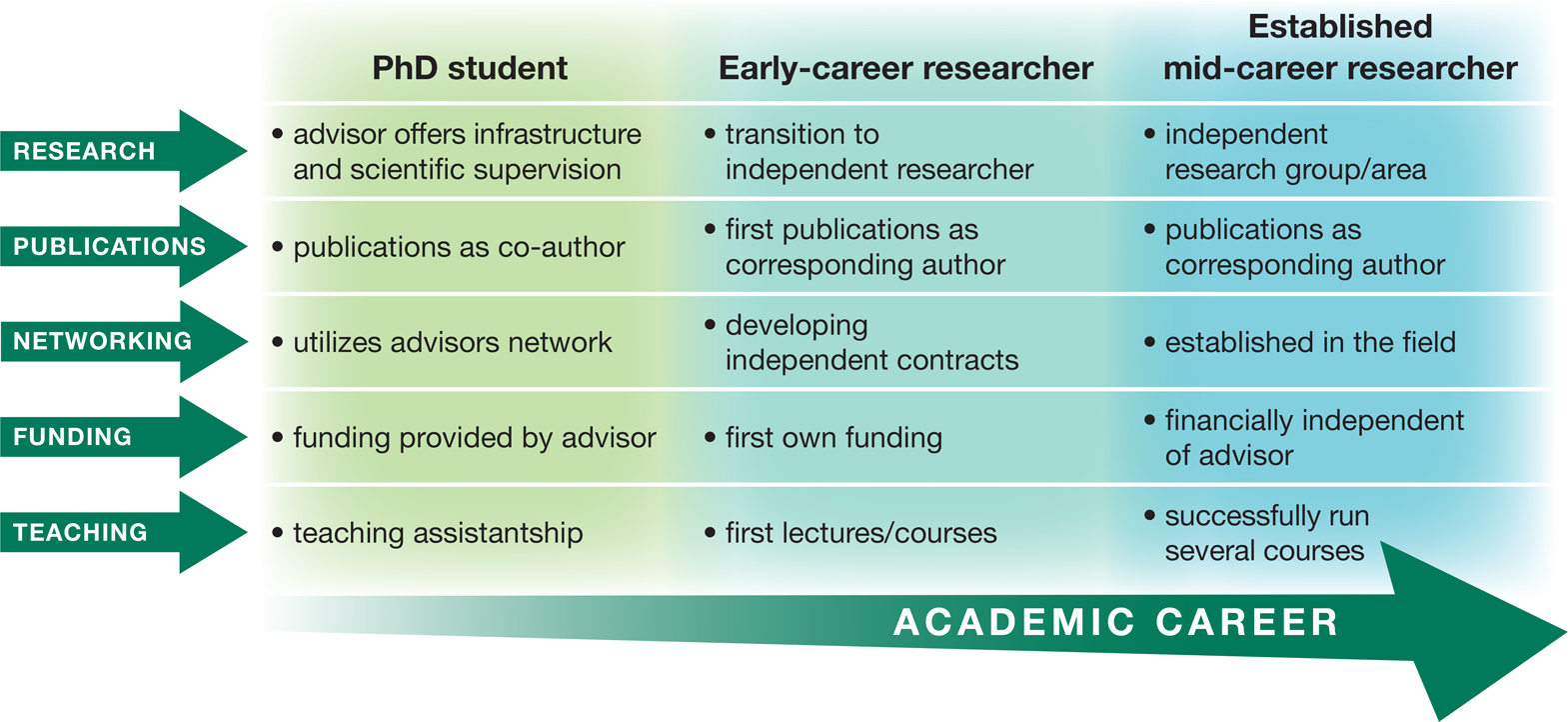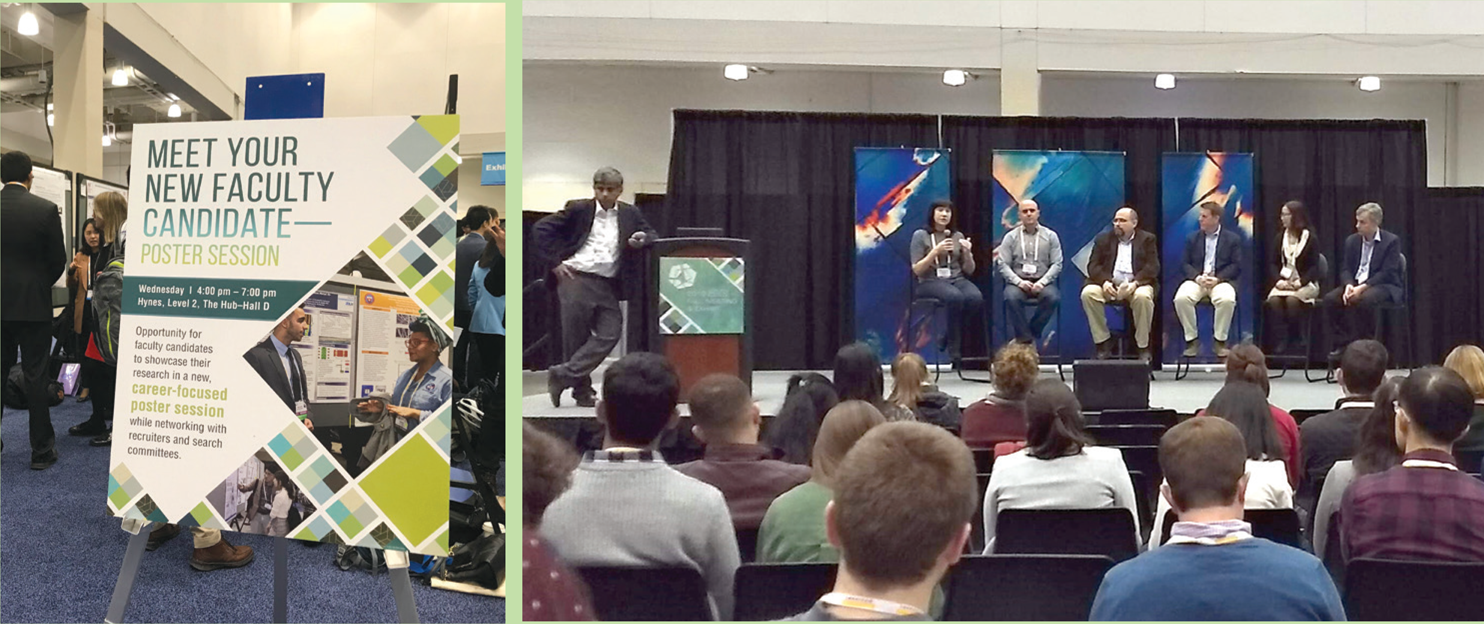When PhD students choose to continue their career in science, they often undertake one or more short-term positions to help establish their careers as independent researchers. Crucial to a successful outcome in these temporary “early-career” positions are appropriate training and support to enable the next career step. However, there is a wide range of such “early-career” positions, and the expectations of these positions have changed over time.
Toward the end of their graduate studies, PhD students are expected to begin showing independence in terms of their professional life. This independence indicates the start of their “early-career” phase, which can be loosely described as being “no longer fully dependent on their advisor but not yet fully established in their chosen career.” As the number of PhD graduates has grown over the years, more time is being spent in this early-career phase until a permanent position is obtained. The unique needs and challenges arising in this particular group are some of the reasons that the Materials Research Society (MRS) founded the Early Career Professionals Subcommittee (ECPSC).
However, while the term “early career” is widely used, a hard definition (e.g., the number of years post-PhD) is difficult to prescribe across differing academic and industrial systems, being often exclusionary. The eligibility criteria of early-career grants illustrates this; the European Research Council specifies 2 to 7 years post-PhD,1 the US Department of Energy specifies under 10 years post-PhD,2 and The Royal Society in the UK specifies the “first five years of a tenure track position.”3 In Figure 1, we explore the stages of an academic career path using descriptive terms, from student, to early career, to established mid-career. Note that we choose to present this as a spectrum, as the transition to an established scientist is often not a hard line, especially given that reaching mid-career is not a straight path for many.

Figure 1. The path of a scientist in the early stages in their career, explored using milestones that many reach on their path to a more established, secure role.
As a committee, we are focused on improving outcomes for early-career professionals, supporting them as they work toward their ideal career path. Scientists meet several general challenges in this phase. Perhaps first and foremost is the lack of security in early-career positions, especially in challenging situations such as the current economic downturn. Effective mentorship (typically from a group leader) can significantly enhance a scientist's career.4,5 In particular, structured mentoring has been shown to be highly effective in creating more diverse and equitable scientific communities.6 However, not all mentors possess the relevant experience or skills to support their mentees on the range of career paths available. Professional societies, such as MRS, can provide an independent bridge of support and knowledge for those who cannot obtain it otherwise.
To explore some personal experiences, we spoke to several members of the ECPSC. One of the major advantages of early-career positions is that they offer significant flexibility to explore different cultures and working environments. Katherine Mazzio, a scientist at Helmholtz-Zentrum Berlin (Germany), told us that “experienc[ing] different cultures and working environments has been really great and has helped her [sic] grow as both an individual and a scientist.” In addition to the flexibility to explore different technical skills, early-career positions offer “the freedom to collaborate on intriguing projects,” said Zachary Hood, Argonne Scholar at Argonne National Laboratory (USA). Further, “the challenges you must take to build your way, receiv[ing] other professionals’ advice, and … networking locally and internationally” can itself be its own reward, said Maria Eugenia Perez, adjunct professor at the Universidad de la República (Uruguay).
However, early-career life can be quite challenging. This starts before the end of the PhD, where one needs to both concentrate on writing a thesis while also wondering about the next career step. Even after you find a position, you will “face the pressures of finding your next position, publishing in high-impact journals, and finding time to balance personal/professional life,” said Hood. Indeed, finding your next position can be especially problematic, as you are no longer a student or yet an established researcher. For Perez, in Uruguay, there are mainly “grants (projects) for students and established researchers, meaning that there is a gap in getting funds” for early-career scientists. Finally, given the insecurities of early-career positions, you are vulnerable to your hard work being exploited. Mazzio told us that “understanding when I am being scientifically exploited and how to navigate these types of situations” has been a particular challenge. It is worth noting that this can be especially problematic for international researchers, as their ability to stay in the country is often tied to the satisfaction of their academic advisor.
MRS and the ECPSC members have all made a commitment to improve outcomes for early careers through various initiatives. For example, Hood believes “MRS and mentors can improve the outcomes for early-career researchers (ECRs) by providing tools and experiences that help ECRs overcome the challenges they face.”
Further, “MRS is a crucial point for networking, as the limited number of researchers in Uruguay makes it difficult to find appropriate collaborators on a related topic,” said Perez. The subcommittee itself provides an opportunity to “contribute to the direction of some of the broader impacts programming that the MRS puts on,” said Mazzio. An important part of this programming is ensuring our committee represents a wide range of career trajectories and directions. We hope that this will lead us to produce more effective programming for the broader MRS membership.
Despite being a relatively young committee (our first events took place at the 2019 MRS Fall Meeting), we have had the opportunity to run a number of events to improve early-career outcomes. These have spanned from poster sessions to interactive webinars. Two events organized at the 2019 MRS Fall Meeting were the “Meet Your New Faculty Candidate—Poster Session” and the “Careers at Government Laboratories and User Facilities—Panel Discussion” (Figure 2), which were highly successful, as demonstrated by the large number of participants. Both events provided a platform for young researchers to get in contact with potential employers from academia and industry. Hood, who was involved in organizing both, said that “the participation of MRS members in each of the events brought new insights in the form of deep questions, new perspectives, revitalized vision, and revised value propositions for the events.” For the 2020 MRS Fall Meeting, we are expanding this event into a dedicated early-career symposium (Symposium BI01: “Early-Career Development—Insights from Academia and Industry”) in a fully virtual format, with talks and panel discussions aiming to elucidate career paths.

Figure 2. Two successful ECPSC events at the 2019 MRS Fall Meeting.
We are also starting to explore organ-izing events that cater to a wider audience. One recent event, the “How to Land a Faculty Position” webinar series, included sessions on research-intensive schools in the United States, undergraduate institutions in the United States, and positions at European institutions. Two of the three sessions maxed out registration, and Mazzio, who was heavily involved in this program, noted that “the extension of the initial idea to include a more international scope really went over well with the audience. Information related to faculty application processes and funding doesn't seem to be as easily accessible or consistent across institutions in Europe as it tends to be in the United States.”
These sentiments were mirrored by Perez, who has been involved in earlier events, such as the 2018 MRS Fall Meeting “Career Development Summit” of the MRS University Chapters. Regarding that event, Perez said, “It exceeded our expectations in terms of audience and audience active participation.” These experiences highlight both the importance and the strong desire for these events in ongoing MRS programming. Indeed, online events also allow a broader participation compared to in-person meetings.
Looking forward, the committee is keen to continue developing their programming to better serve early-career researchers. One opportunity might be a networking session with research program managers in order to learn current and future research directions and funding priorities. Mazzio highlighted two further possibilities: First, “it will be interesting to take a quantitative approach to understanding how these programs have impacted ECRs in the future.” In particular, the subcommittee is working on surveys to gain a better glimpse into the faculty hiring process, which, if successful, could be expanded to other career routes. Second is the possibility to improve outcomes by “leadership training and certification for mentors with an emphasis on ECR outcomes.” This reflects that in any mentoring relationship, both the mentee and mentor need to work together to ensure success.
“It is essential to set your goals in the short and long term[s]. Failure is inherent to the career, but you should try to enjoy the path and take advantage of your strengths; opportunities will come,” said Perez. Hood advised people to “get involved in committees or subcommittees at your institution or within your professional organization(s). This involvement will connect you with a community that can help turn small ideas into bigger possibilities.”
The ECPSC seeks to provide an alternative source of support for early-career professionals. As we continue to develop our programs, we hope that both mentors and mentees will join us in working on our mission. If you would like to get involved (or have any thoughts for future directions), please get in touch directly with the authors or via [email protected].
Acknowledgment
The ECPSC members are grateful to Ms. Pamela Hupp of MRS for her guidance and unconditional support of this SC. The authors thank Jagjit Nanda, Oak Ridge National Laboratory, for feedback on this article.





